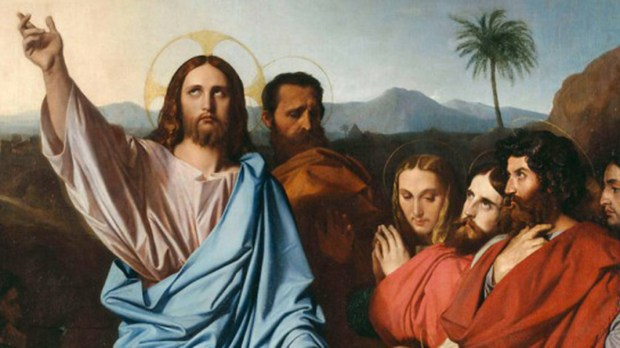There is nothing more freeing than knowing who you are and where you are going, with nothing holding you back.
In the 23rd Sunday of Ordinary Time (Year C), Jesus shows us how it is done.
It is easy to forget who we are and just become one of the multitudes.
In this Sunday’s Gospel, Jesus is being followed by a great crowd who are no doubt excited by what he has just promised: The great banquet of heaven, to which all the forgotten are invited.
But he knows what often happens in religion. At several points in the Gospel, he has stopped and invited individuals to follow him. But this isn’t like that. Now “great crowds” were doing so — not a collection of friends who each had a personal encounter with Jesus, but a crowd who had a group encounter with him.
Jesus’ task is to weed them out — not because he doesn’t want them all (he does) but because he wants them each to be truly his follower.
So he asks them what he asks us: Are we following him, or just following the crowd?
First, he tells them they cannot be his disciples “without hating father and mother, wife and children, brother and sisters, and even his own life.”
In Semitic usage, “hate” here doesn’t mean despise. It means prioritize lower. It means that the love we have for Jesus should be different in kind from the love we have for other human beings. For God, we should be willing to do anything and change everything. We should not be willing to do that for fellow human beings.
He is asking: Who are you trying to please? The people around you? Or God?
Next, he reminds us of where we are going, and it’s a place far less pleasant than heaven.
Jesus says “Whoever does not carry his cross and come after me cannot be my disciple.” We often lose the meaning of the phrase “Carry your cross.” We think it just means bearing the burdens we have to bear in life.
It does mean that, but never forget what else it means: The only time you carry a cross after Jesus is when you are being led by your torturer to your death. Our lifelong way of the cross is a lifelong reminder of the fact that we are in the grip of sin that leads to death, Christ’s and ours.
But Jesus isn’t helpless or fatalistic. He knows there is a way to fight back.
His first listeners would have heard “carry your cross after me” and imagined their enemies capturing them and killing them.
And they would have understood his next comments, military metaphors, in the same context.
Jesus says we don’t want to be the guy who starts to build a tower — a defensive structure — and finds out we can’t finish it. We also don’t want to march out against our enemy and be overwhelmed with his numbers, he says.
Jesus Christ is telling us to be on the lookout for the enemy’s approach — and not to let the enemy gang up on us.
What is the tower we build to get perspective on our life? A prayer life, which has to be built and maintained carefully over many days and weeks, months and years. When are we overwhelmed with the enemy’s numbers? When we allow him footholds all around us, in the form of possessions.
Our “lookout tower” is described in the first reading.
Alone, our deliberations are “timid and unsure of our plans,” says the Book of Wisdom, “and the corruptible body burdens the soul.” We can scarce understand our life when we’re dealing with “things on earth” let alone “things in heaven.”
The only way to understand our lives is if we are “given wisdom and sent your holy spirit from on high.”
The tower that can spot our enemy is built in prayer.
St. Paul and Onesimus show how to give the enemy no foothold by “renouncing possessions.”
In the second reading, from Philemon, St. Paul is writing from jail, “a prisoner for Jesus Christ,” to introduce a slave named Onesimus who is now more than a slave — he is a “partner” now that he is “in the Lord.”
There could hardly be two better examples of what Jesus means when he says “any one of you who does not renounce all his possessions cannot be my disciple.”
St. Paul is free and fulfilled even though he is a prisoner. He doesn’t curse his captivity, he enjoys his solitude with the Lord. And Onesimus is free and fulfilled even though he is in slavery, because now he belongs to Jesus Christ.
This is who we need to be in order to meet our enemy: Not tied to relationships that reshape our identity apart from Jesus, and not tied to possessions— but clear of all attachments in Christ.
Then, whether alone or in a crowd, we will know who we are and where we are going, with nothing holding us back.

